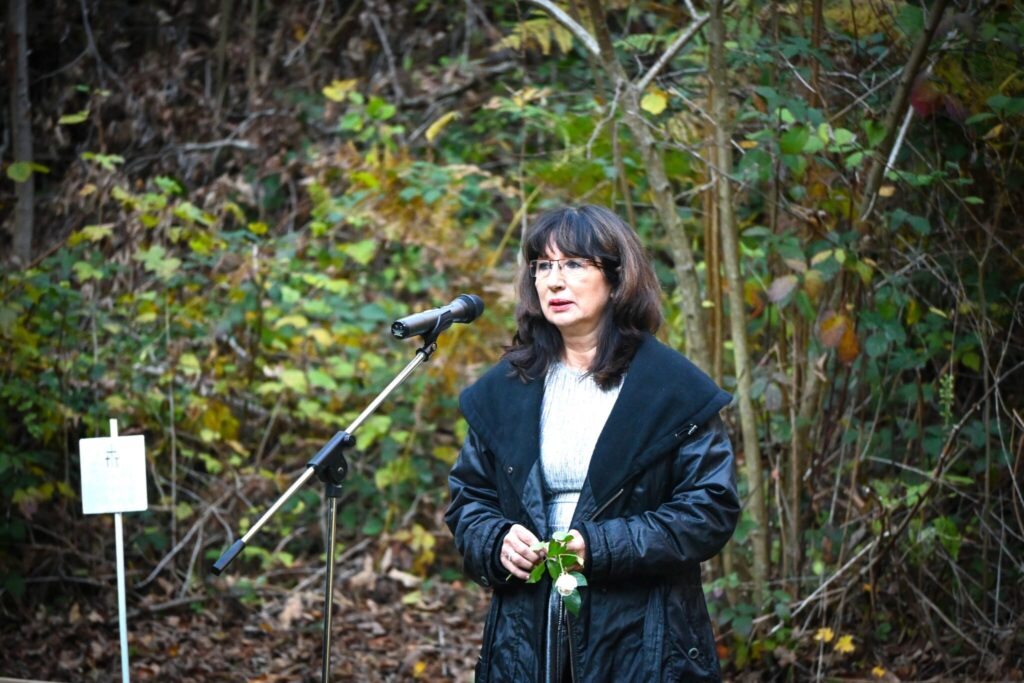A memorial ceremony with holy mass was held at the mass grave in Kucja Valley near Podutik on Sunday. The memorial ceremony was attended, among others, by SDS MP Mojca Škrinjar, who addressed all those who gathered there after the holy mass. The commemoration was also attended by the president of the SDS Women’s Committee Ljubljana, Ksenija Sever, and the president of the SDS Christian Forum, Dejan Škvarc.
More than 800 post-war victims, who were killed by the Yugoslav Communist authorities in May 1945 and then thrown into the Big Brezar Shaft, are buried in Kucja Valley. Due to hygienic conditions, the bodies of the victims were brought from the Big Brezar Shaft to the mass grave in Kucja Valley in June 1945.
In her address, SDS MP Mojca Škrinjar said that the mass grave in Kucja Valley is a silent grave: “There are graves of all kinds. Stone graves, marble graves, green graves, ones with flowers, and abandoned ones. There are graves from which golden letters practically scream into the sky, and then there are silent graves. The mass grave in Kucja Valley near Podutik is a silent grave.”
The DEMOS coalition agreed to arrange for the mass grave in Kucja Valley
“In the years from 1990 to 1995, the DEMOS coalition ruled in the Šiška district community, by a narrow majority. I am proud to have been part of this coalition when the decision was made to arrange for the mass grave in Kucja Valley. We voted to clearly mark this place as well. We adopted the decree declaring the Big Brezar Shaft and the mass grave of the victims of the post-war massacres a cultural and historical monument,” Mojca Škrinjar said in her address and also clearly condemned all three totalitarianisms, which caused so much misery to the Slovenian nation. “Today, we are witnessing the question of the Slovenian Parliament signing and joining the resolution against the three totalitarianisms – fascism, Nazism and communism – being discussed. Anyone who wonders and doubts whether this should really be done or not is not a true democrat. I think the only way to live well and in coexistence is to live in a democracy. To spiritualise democracy and humanity as values.”
Innocent victims in the Big Brezar Shaft never found peace
The commemoration in Kucja Valley was also attended by the SDS Women’s Committee and the SDS Christian Forum. The president of the SDS Women’s Committee Ljubljana, Ksenija Sever, also addresses those gathered, who began her speech with a story from the Bible: “The story from the Bible tells us that when God revealed himself to Moses in the form of a burning bush, he said: ‘Do not come closer! Take your sandals off your feet, for the place where you stand is holy ground.’ It is as if God wanted to tell Moses that the place where he was standing is special, consecrated, so out of respect, he should take his shoes off his feet and not walk on it as if it was just some ordinary grass.”
“The place where we are standing now is also special and sacred due to all of the suffering and the death of so many innocent people. Here, they were brutally killed by the Slovenian communists in May of 1945, immediately after the end of World War II. The innocent murdered victims in the Big Brezar Shaft have not yet found their peace,” Ksenija Sever said, continuing: “Barely a month later, the slain victims who were murdered due to an order made by the head of the Department for People’s Protection, Matija Maček, were already moved to Kucja Valley, where they found their final resting place, their peace and a place to be remembered. Slovenian Communist leadership (Kardelj, Kidrič), which commanded even after the war, liquidated anyone who did not agree with it.”
At the end of her speech, Sever highlighted Albert Svetina, who personally witnessed the crimes of communism committed in the Big Brezar Shaft and described them in his book From the Liberation Movement to Banditry (Od osvobodilnega boja do banditizma). After witnessing the horrifying scenes in the Big Brezar Shaft, everything changed in Svetina. He was then expelled from the Department for People’s Protection. He was also thrown out of his apartment. Fearing that he would be liquidated, he secretly emigrated to Hungary. In 1992, Albert Svetina also testified before the Pučnik Commission of Inquiry into post-war crimes.
Sara Kovač


